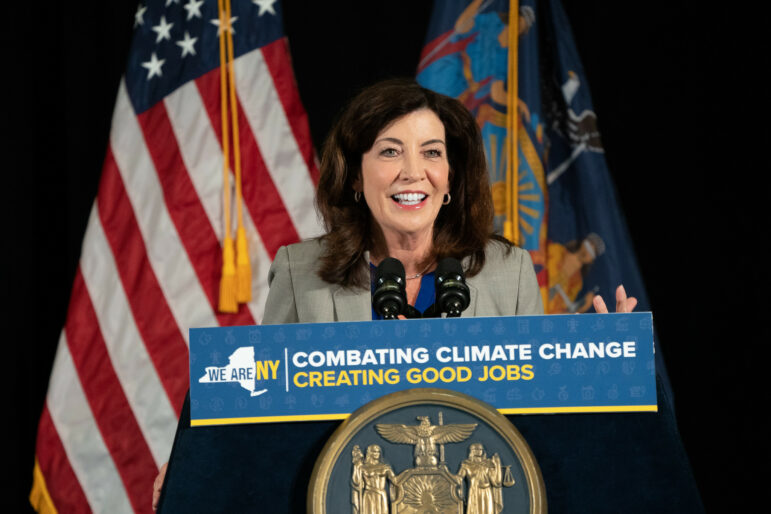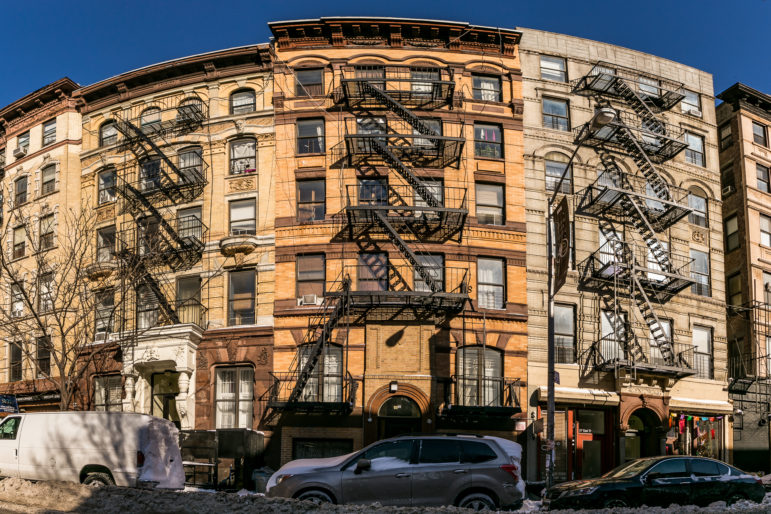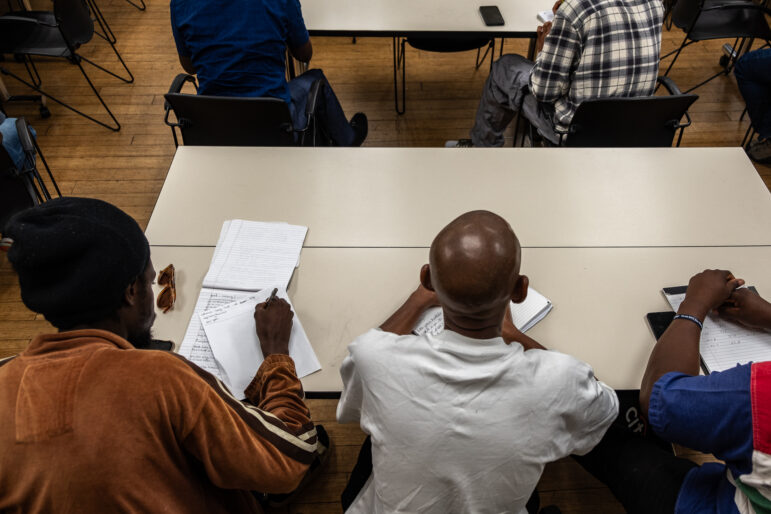Bronx incumbent Gustavo Rivera and DSA-endorsed Kristen Gonzalez both seemed likely to prevail in their State Senate races, despite being targeted by SuperPACs that spent hundreds of thousands of dollars to undermine the progressive candidates, stuffing mailboxes with flyers and running digital ads disparaging them or boosting their opponents.
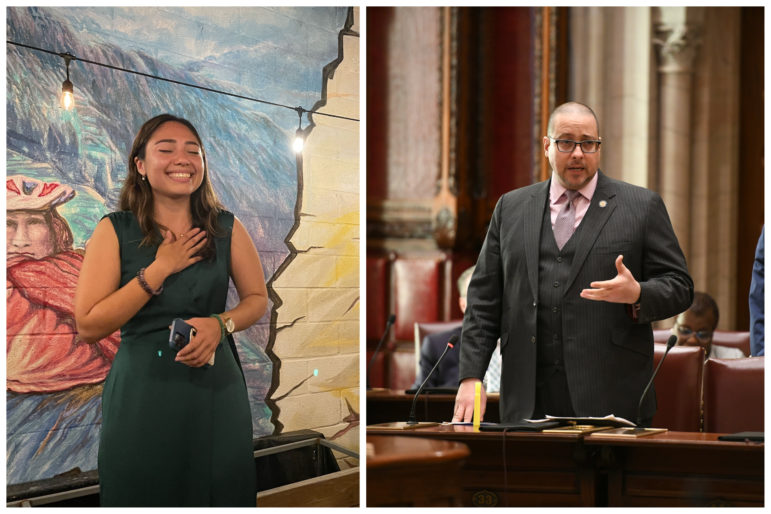
Kristen Gonzalez Campaign, NYS Senate Media Services
Left: Kristen Gonzalez after her primary win. Right: Gustavo Rivera in the state Senate chambers.Better luck next time?
A collection of business-backed SuperPACs spent hundreds of thousands of dollars to topple a pair of left-wing Democrats in contentious state Senate races Tuesday. It looks like they wasted their money.
Progressive Bronx incumbent Gustavo Rivera appears likely to withstand a primary challenge from more moderate attorney Miguelina Camilo in the redrawn 33rd District, while Democratic Socialists of America-endorsed Kristen Gonzalez defeated ex-Queens Councilmember Elizabeth Crowley in the primary for a new district spanning parts of Queens, Brooklyn and Manhattan.
Rivera and Gonzalez were each targeted by SuperPACs that stuffed mailboxes with flyers and ran digital ads disparaging them or boosting their opponents. The groups sought to undermine progressive candidates and incumbents who have opposed a key developer tax break, backed stronger tenant protections and defended 2020 reforms to state bail laws.
The so-called independent expenditures are made possible by the U.S. Supreme Court’s 2010 Citizens United decision, which allowed for unlimited outside spending on behalf of candidates, so long as the actual campaigns are not involved.
But progressive political consultant Camille Rivera (no relation to Gustavo), whose firm New Deal Strategies represented the Bronx incumbent, said most voters don’t buy into attacks paid for by outside firms, even if they are filling their mailboxes on a daily basis.
“Elections aren’t for sale, period,” she said. “Voters aren’t stupid.”
She said Gustavo Rivera’s campaign countered the outside money by going door-to-door in the district and by receiving support from labor unions like 1199, the Hotel Trades Council, the United Federation of Teachers, New York State Nurses Association and the Retail, Wholesale and Department Store Union.
Gustavo Rivera faced a tough challenge from Camilo, who originally sought to run in the 34th District and had the backing of the Bronx County Democratic Party. She also got a lift from three SuperPACs that spent more than $436,000 to boost her campaign. But Rivera still managed to receive just under 52 percent of the vote compared to about 47.3 percent for Camilo, with about 98 percent of ballots counted in Senate District 33 late Tuesday night. Only around 11,000 people voted in person, with another 1,543 submitting valid absentee ballots.
One mailer paid for by the committee New Yorkers for a Better Community and sent to District 33 Democrats this month targeted Rivera for opposing the renewal of the controversial 421a program, which provides a hefty property tax break for developers who cap rents in a portion of their units for middle-income earners.
The committee received $100,000 from the Neighborhood Preservation PAC, a campaign spending operation connected to the Rent Stabilization Association landlord interest group, earlier this month, records show.
“[Rivera] refused to save existing programs to build more affordable housing,” the mailer states. “And opposes creating new affordable housing programs.”
In a statement, Rivera attacked that characterization and said that he has “always stood with tenants over real estate. That’s why the real estate lobby is spending such large sums of money to unseat me.”
The pro-charter school committee New Yorkers For A Balanced Albany—funded by the Walton family, which owns WalMart, and other business groups—spent at least $307,000 on TV ads, mailers and polling to boost Camilo or take down Rivera, disclosure records show.
Over in the newly created 59th District, Gonzalez, a former intern for Sen. Chuck Schumer who later worked at a credit card company, defeated Crowley by a wide margin to win the Democratic primary. Gonzalez opposes renewing the 421a program or enacting a slightly modified version put forth by Gov. Kathy Hochul last year, likely making her a target for real estate interests. She supports legislation that would limit a landlord’s ability to hike rents or evict tenants from non-stabilized apartments without “good cause” that they can prove in court.
SuperPACs spent more than $106,000 to boost Crowley or undermine Gonzalez—even buying digital ads that promoted another socialist candidate, Nomiki Konst, after she had already dropped out, Patch reported.
Two of the anti-Gonzalez committees, Common Sense New Yorkers Inc. and Voters of NY Inc., share a common treasurer, Jeffrey Leb. In an emailed statement, Leb pointed out that most of the other candidates backed by the two committees ended up winning their races—though many of those contests were relatively uncompetitive.
“I think the most important message is that unlike in previous years, we’re not going to allow extreme candidates to run unopposed and we will push back as necessary to educate voters on their radical positions,” Leb said.
A Congressional candidate targeted by the two committees, Yuh-Line Niou, narrowly lost the Democratic primary in the new NY-10 to wealthy former prosecutor and centrist candidate Dan Goldman.
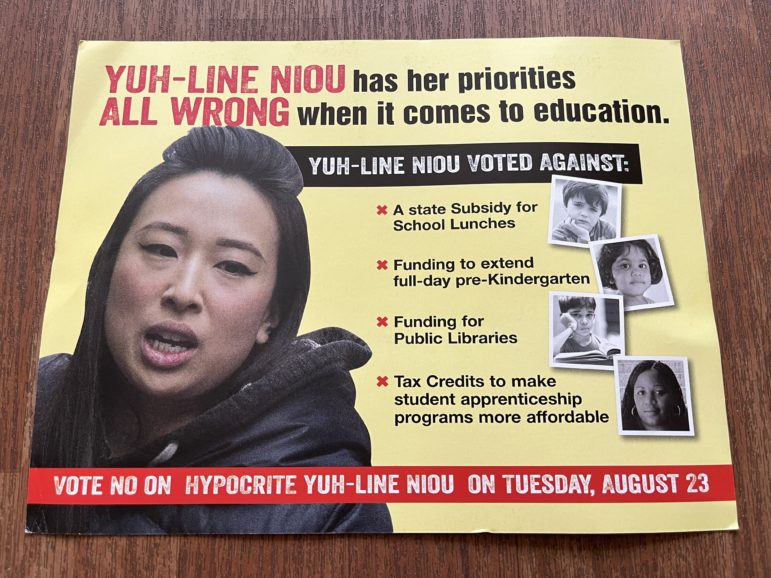
Jeanmarie Evelly
A flyer criticizing Congressional candidate Yuh-Line Niou, paid for by an independent expenditure committee dubbed the New York Progressive PAC.The Common Sense committee, and a related group involved in the 2021 New York City elections, has received significant funding from real estate interests. In the days leading up to the primary, property management firm SCF Management; Richard Scharf, the president of Abro Management; and Morris Missry, a partner in the real estate law firm Wachtel Missry, each chipped in $25,000 checks.
One pro-Crowley committee affiliated with the District Council 9 painters union—of which Crowley was once a member—took in $150,000 from real estate interests, like the Real Estate Board of New York campaign affiliate, ahead of the primary, The City reported. The committee known as NYC Forward, bought YouTube ads that feature clips of assaults and shootings with a message of support for Crowley: “We need a serious Democrat who will protect our streets,” the ad reads, before cutting to a headshot of the candidate.
Down by about 25 percentage points, Crowley conceded defeat Tuesday night.
She sought to distance herself from the independent expenditures, but the ads may have hurt her with voters in one of the city’s most left-leaning districts, said John Jay political science Prof. Susan Kang, an organizer with the DSA.
“There were a lot of negative fear-based ads that were attacking Kristen Gonzalez without really making a case for Liz Crowley and I don’t think that’s as effective,” Kang said.
All told, the outside committees spent around $1.7 million to boost or target candidates in New York State Senate primaries and the November general election, nearly all of them in New York City, disclosure records show.
Incumbent State Sen. Robert Jackson, who represents parts of Northern Manhattan and The Bronx, won the primary in his redrawn district over challenger Angel Vasquez, who received some SuperPAC backing. Vasquez got support from Common Sense New Yorkers, which spent more than $14,700 on mailers, and the pro-charter school PAC Students First New York Inc., which directed $66,500 for mailing and text campaigns. He got about 33 percent of the vote.
But, as Leb noted, it wasn’t a total loss for big money SuperPACs. Seven candidates with backing from the Common Sense and Voters of NY committees ended up winning, including an incumbent in a tough race in Brooklyn and another politician seeking an open seat in The Bronx.
Brooklyn State Sen. Kevin Parker fended off a leftwing challenge from democratic socialist David Alexis, a labor and climate organizer who founded an employee-owned ride share company, and a third candidate Kaegan Mays-Williams. Common Sense New Yorkers paid more than $32,000 for mailers and a newspaper ad backing Parker, records show.
And in a newly drawn 34th District covering parts of the East Bronx and southern Westchester County, Nathalia Fernandez, a current assemblymember, handily won a three-candidate primary. The Voters of NY Inc. committee spent more than $28,500 on mailers backing Fernandez, who also had the endorsement of the Bronx County Democratic Party and the Working Families Party. Another group, NYCDCC Carpenters for Progress, spent more than $32,000 on pro-Fernandez materials.
About 40 percent of all outside spending in the odd August primary came from a committee funded by Madison Square Garden Entertainment Corp., whose owner James Dolan also lays claim to the Knicks, the Rangers and the World’s Most Famous Arena. The committee, named the Coalition to Restore New York, backed a slate of 10 candidates, including Camilo, Parker and Vasquez, who it said are “committed to improving the lives of hardworking New Yorkers and keeping their constituents safe.”
As Gothamist reported earlier this month, Dolan has another reason to try to tip the scales: MSG hasn’t paid property taxes in 40 years thanks to an exemption approved by the state legislature in 1982. New York City has missed out on $875 million from that deal, the Independent Budget Office estimates. Lawmakers could revisit that break, especially as a plan to transform Penn Station, located below the arena, takes shape.
In the end, the big bucks resulted in little success, Kang said.
“Money doesn’t just buy elections no matter what,” she said.



